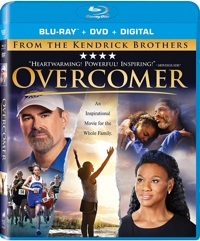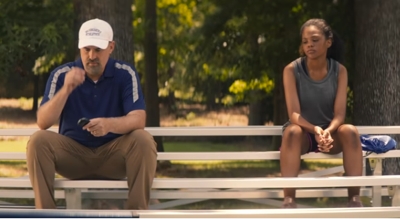 Grade: B-/C+
Grade: B-/C+
Entire family: Yes
Christian sports drama
2019, 119 min., Color
Sony Pictures
Rated PG for some thematic elements
Aspect ratio: 2.39:1
Featured audio: DTS-HDMA 5.1
Bonus features: C+
Includes: Blu-ray, DVD, Digital
Trailer
Amazon link
Overcomer is the latest inspirational Christian film from brothers Alex and Stephen Kendrick, with Alex serving once again as director and also starring. Like the others before it—Flywheel (2003), Facing the Giants (2006), Fireproof (2008), Courageous (2011), and War Room (2015)—there’s frequent mention of God and prayer. Unlike the others, there are quite a few come-to-Jesus moments rather than a single pivotal one. That’s not a criticism, mind you. It’s a fact. If you’re put off by preachy films (“You were created to know and worship Him”), then you won’t want to buy or stream this one.
 But it’s also a fact that the Kendrick brothers keep improving. The writing is a little more polished, the camerawork has grown stronger, and there are more sophisticated shots—some, in this film, using drones. The overall production values are far superior as well, the result of a $5 million budget (compared to the $20,000 budget the Kendricks had to work with for their first film). While the brothers’ early films mostly cast members of their Sherwood Baptist Church in Albany, Georgia (where Kendrick was an associate pastor), they’ve graduated to using more professional actors . . . and that also help to elevate the overall quality. This time there’s also a killer soundtrack, with the highlight a song (“You Say”) by Grammy- and American Music Awards-winner Lauren Daigle.
But it’s also a fact that the Kendrick brothers keep improving. The writing is a little more polished, the camerawork has grown stronger, and there are more sophisticated shots—some, in this film, using drones. The overall production values are far superior as well, the result of a $5 million budget (compared to the $20,000 budget the Kendricks had to work with for their first film). While the brothers’ early films mostly cast members of their Sherwood Baptist Church in Albany, Georgia (where Kendrick was an associate pastor), they’ve graduated to using more professional actors . . . and that also help to elevate the overall quality. This time there’s also a killer soundtrack, with the highlight a song (“You Say”) by Grammy- and American Music Awards-winner Lauren Daigle.
What further elevates this film is a more savvy sense of potential audiences. Some of the earlier Kendrick brothers’ films felt like simple parables that followed the same facile conversion/resolution that readers encounter in the Bible—a Saul-to-Paul transformation that begins close to rock bottom and pivots to salvation after the subject finds Jesus. Overcomer is a little more sophisticated than that, insomuch as it juggles a number of conversions or reconversions of people who are at different stages of life and belief. As preachy films go, this one has more plotting and interest.
Kendrick, a marginally passable actor, plays John Harrison, a history teacher and basketball coach at Brookshire  Christian School who prioritizes basketball above all else in his life. Shari Rigby plays Amy, his wife who thinks he should be more involved with their sons’ lives apart from basketball—though not enough, apparently, for the filmmakers to make the boys more than window dressing. Priscilla Shirer, meanwhile, plays Principal Brooks, who insists that John take over coaching the Cross-Country Team after their whole town downsizes following a massive plant lay-off and his basketball team is decimated. What follows is as predictable as Hoosiers and almost as rousing.
Christian School who prioritizes basketball above all else in his life. Shari Rigby plays Amy, his wife who thinks he should be more involved with their sons’ lives apart from basketball—though not enough, apparently, for the filmmakers to make the boys more than window dressing. Priscilla Shirer, meanwhile, plays Principal Brooks, who insists that John take over coaching the Cross-Country Team after their whole town downsizes following a massive plant lay-off and his basketball team is decimated. What follows is as predictable as Hoosiers and almost as rousing.
John’s focus soon shifts to Hannah Scott (Aryn Wright-Thompson), an orphan raised by her grandmother. Hannah is the only student to show up for Cross-Country try-outs. Asthma and all, she’s his entire team. It’s a little troublesome that the Kendricks felt that they had to make this African American girl a thief, especially when her thievery isn’t really integral to the plot. She squirrels away her stolen items rather than using them, but the reason for doing so is never revealed—just as we never know why John remarks that he put his watch down and now it’s gone, but never looks for it or questions where it went until she presents it to him later (you knew it would happen). It’s also unfortunate that the Kendricks felt compelled to make an old blind African American man a former drug addict, so that the only criminal elements in the film were ascribed to black characters. But I suppose it’s good that the Kendricks included African Americans as major characters at all, rather than just slipping them in as token extras. The principal is black, and they get points for having the blind man, Thomas (Cameron Arnett), be the one to help John see that he wasn’t focusing enough on Christ.
 Young viewers might be able to identify with Hannah, middle-age viewers with John and his wife, and older viewers with Thomas. All three generations at different stages of life wrestle with problems that are solved by accepting Jesus, and while it happens most movingly with Hannah it’s the Yoda-like wisdom of Thomas and his relationship with Hannah, not John’s, that emerges as the subplot that generates the most interest and gets the Christian message across in a more subtle and palatable way. If the Kendricks figure out how to follow Thomas’s lead in future films, they might be able to take the next leap and create faith-based films that don’t whack people over the head with a Bible or hymnal.
Young viewers might be able to identify with Hannah, middle-age viewers with John and his wife, and older viewers with Thomas. All three generations at different stages of life wrestle with problems that are solved by accepting Jesus, and while it happens most movingly with Hannah it’s the Yoda-like wisdom of Thomas and his relationship with Hannah, not John’s, that emerges as the subplot that generates the most interest and gets the Christian message across in a more subtle and palatable way. If the Kendricks figure out how to follow Thomas’s lead in future films, they might be able to take the next leap and create faith-based films that don’t whack people over the head with a Bible or hymnal.


Leave a comment